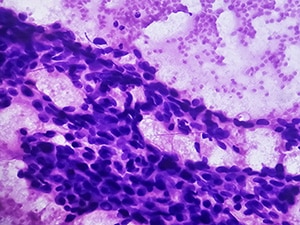HER2-targeting Therapy for HER2-ultralow Breast Cancer
The FDA has approved fam-trastuzumab deruxtecan-nxki for certain HER2-low or HER2-ultralow breast cancers.
The U.S. Food and Drug Administration (FDA) has approved fam-trastuzumab deruxtecan-nxki (T-DXd; Enhertu) for the treatment of unresectable or metastatic, hormone receptor (HR)-positive, human epidermal growth factor receptor 2 (HER2)-low or HER2-ultralow breast cancer that did not respond to or progressed following one or more endocrine therapies.

The FDA concurrently approved a companion diagnostic test to detect HER2-ultralow cancers.
T-DXd is a targeted therapy called an antibody-drug conjugate. The antibody part, trastuzumab, binds to the protein HER2, which is overexpressed on the surface of some types of breast cancer cells. When T-DXd binds to HER2, it is brought inside the cell, where it releases deruxtecan, a toxic drug that can kill the targeted cell as well as other cancer cells nearby.
HER2 positivity is determined by how much HER2 is expressed in the cancer cells. T-DXd was previously granted accelerated approval to treat unresectable or metastatic cancers that are HER2-positive, indicating strong HER2 expression, regardless of where in the body they originate. T-DXd was also previously approved to treat unresectable or metastatic breast cancers that had been previously treated with chemotherapy and that were classified as HER2-low, meaning they express HER2 but not strongly enough to be considered HER2-positive. The current approval allows patients with HR-positive breast cancer whose tumors have progressed during or following endocrine therapy and are HER2-low or HER2-ultralow to also receive T-DXd.
The approval was based on results from the randomized, multicenter, open-label phase III DESTINY-Breast06 clinical trial, which were presented at the 2024 San Antonio Breast Cancer Symposium, an annual conference co-organized by the American Association for Cancer Research (AACR). Researchers enrolled 866 patients with advanced or metastatic, HR-positive, HER2-low or HER2-ultralow breast cancer who had not previously received chemotherapy for advanced or metastatic disease. Patients were randomly assigned (1:1) to receive either T-DXd or chemotherapy.
Among patients with HER2-low cancer, those treated with T-DXd survived a median of 13.2 months without disease progression, compared to 8.1 months for those treated with chemotherapy. Among patients with HER2-ultralow cancer, those treated with T-DXd and chemotherapy survived without disease progression for a median of 15.1 months and 8.3 months, respectively. Further, 65.7% of patients with HER2-ultralow disease experienced a response when treated with T-DXd, and 30.8% experienced a response when treated with chemotherapy.
The prescribing information for T-DXd contains a boxed warning for interstitial lung disease and embryo-fetal toxicity.
The recommended dose of T-DXd is 5.4 mg/kg of body weight given intravenously every three weeks until disease progression or unacceptable toxicity.
Breast cancer is the most common non-skin cancer and second leading cause of cancer death among women in the United States. Around 81% of breast cancers have been traditionally considered HER2-negative, but researchers estimate that around 60% of those cancers are actually HER2-low. According to federal statistics, it was estimated that 310,720 individuals would be diagnosed with breast cancer and 42,250 patients would die of the disease in the United States in 2024.
The FDA rendered its decision on January 27, 2025. Check this resource for updated information on all therapeutics regulated by the FDA.